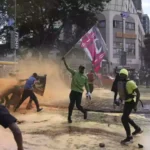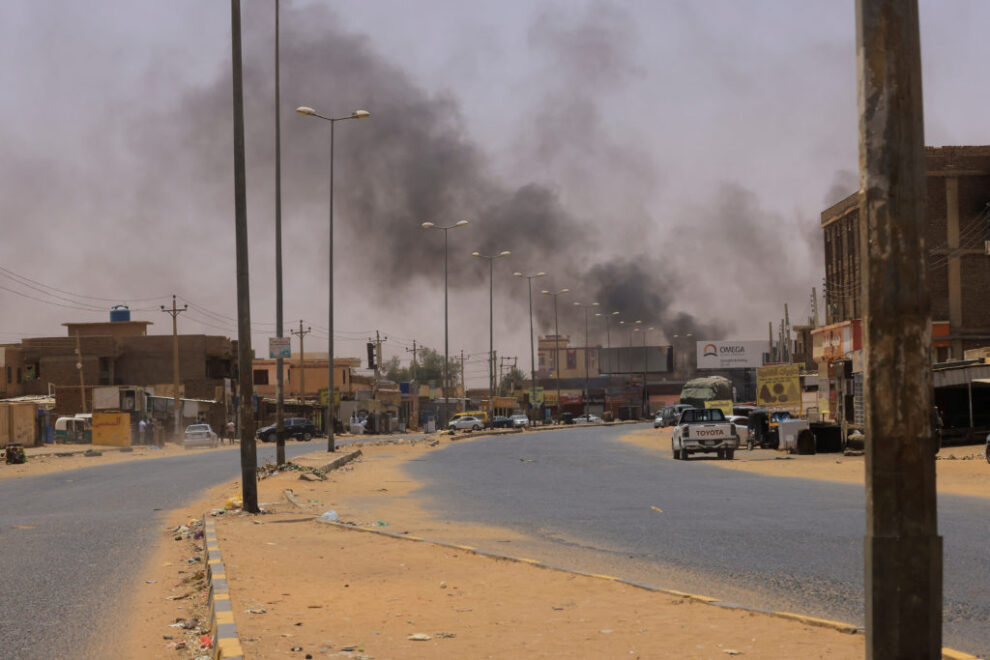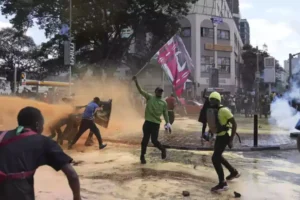The Sudanese army and paramilitaries exchanged shells on Monday from opposite banks of the Nile in the capital, Khartoum residents reported, in the seventh month of a war whose atrocities have been denounced by NGOs.
“The army, from Omdourman on the west bank, and the Rapid Support Forces (RSF) from Khartoum-North on the east bank”, exchanged artillery fire and rockets, a witness told AFP.
This account is corroborated by other residents, including local activists, who claim that dozens of civilians have been killed in the bombardments in recent weeks.
The conflict that broke out on 15 April between the head of the army, General Abdel Fattah al-Burhane, and his deputy-turned-rival, General Mohamed Hamdane Daglo, has claimed more than 10,000 lives, according to an estimate by the NGO Armed Conflict Location & Event Data Project (Acled), which is widely considered to be an underestimate.
It has also displaced more than six million people, according to the UN, and destroyed most of the country’s infrastructure.
At the negotiating table, the two sides have little intention of making concessions, as demonstrated once again by the failure in early November of negotiations sponsored by the United States and Saudi Arabia.
On Monday, the RSF claimed to have “attacked the Wadi Seidna base”, a strategic air base north of Khartoum, “destroying a C130 military transport aircraft and an ammunition depot”.
More than 800 kilometres to the south-west, in al-Muglad, West Kordofan, the army withdrew from a base after an attack by paramilitaries in this oil-rich region, witnesses reported.
In the same state, in Babanusa, witnesses reported aerial bombardments by the army targeting paramilitaries. The army has retreated several times in recent weeks, while the RSF has taken control of military bases in the vast western region of Darfur.
– Organised ethnic massacres –
The paramilitaries announced that they had taken “total control” of El Daein, the capital of East Darfur, marking the latest in a series of lightning advances by the RSF in Darfur, where only the capital of North Darfur, El Fasher, is still in the hands of the army.
Experts, aid workers and the United States have warned of an imminent attack on El Fasher, while human rights activists have reported massive ethnic massacres in the localities controlled by the RSF in Darfur, which has already been ravaged by decades of ethnic violence.
In a report published late on Sunday, Human Rights Watch (HRW) called on the UN Security Council to act to prevent further atrocities after the killing of hundreds of civilians in Darfur.
“Ethnic killings by the RSF in West Darfur have the hallmarks of an atrocity campaign against Massalit civilians”, a non-Arab ethnic minority targeted by the paramilitaries, said Mohamed Osman of HRW.
“The UN Security Council must stop ignoring the desperate need to protect civilians in Darfur”, he added.
In the town of Ardamata alone, at the beginning of November, more than 1,000 people were killed, according to the European Union, by armed groups who forced more than 8,000 people to flee to neighbouring Chad in one week, according to the UN.
– Mass graves -Survivors told HRW of mass killings, ethnically motivated executions, arbitrary detentions, torture, looting and sexual violence.
HRW has verified satellite images that appear to confirm eyewitness accounts of newly dug mass graves where civilians buried their dead before fleeing.
The NGO also warned that the imminent closure of the UN mission in Sudan would “significantly reduce UN monitoring of the situation”.
Sudan called this month for an end to the mandate of the UN mission, which has been operating mainly in the army-controlled east of the country since the start of the war.
Source : Africa News
















